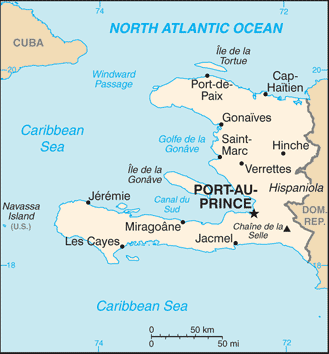 After 13 years of occupying the country—during which they fired on protesters and accidentally introduced cholera to the island, setting off an epidemic—UN "peacekeepers" were finally withdrawn from Haiti in October. To take up the slack in figting drug gangs in the capital Port-au-Prince, the United Nations has called for increased international support for the 15,000-strong Haitian National Police.
After 13 years of occupying the country—during which they fired on protesters and accidentally introduced cholera to the island, setting off an epidemic—UN "peacekeepers" were finally withdrawn from Haiti in October. To take up the slack in figting drug gangs in the capital Port-au-Prince, the United Nations has called for increased international support for the 15,000-strong Haitian National Police.
But this call is cast in a dubious light by a harrowing Nov. 18 Al Jazeera report on what appears to have been a police massacre during a supposed anti-gang raid on a Port-au-Prince school. The raid ended in at least seven dead—including students and teachers, all evidently unarmed. Local residents are saying the number of dead may actually be higher, and assert that there were no armed men inside the school when National Police troops charged in and opened fire.
Some of the victims may have been killed execution-style in retaliation for the slaying of two police agents elsewhere in Port-au-Prince earlier that day.
Deja vu for dictatorship
Amid all this, Haiti's President Jovenel Moise is moving to re-establish the country's army after 22 years—in the name of fighting the narco-gangs, of course. On Nov. 16, he named former army colonel Jodel Lesage as acting commander-in-chief, moving troops closer to full operation, Reuters reports. The appointment still needs to be approved by Haiti's senate. But two days later, Moise welcomed the army's anticipated return with a parade featuring dozens of camouflaged soldiers toting rifles in the northern coastal city of Cap-Haitien
Haiti has been without an army since 1995, when populist president Jean-Bertrand Aristide disbanded the military after returning to power following a coup. But veteran officers of the disbanded army were behind the 2004 coup that ousted Aristide for a second and final time. And some of these same veteran officers are themselves implicated in the narco trade.
But the most notorious of these is Guy Philippe, a former paramilitary enforcer for the gang behind the 2004 coup, who was arrested by the DEA in Port-au-Prince in January and flown to Miami to stand trial on cocaine trafficking charges. In June, he was sentenced to nine years in prison after copping a plea—admitting to a money laundering charge in exchange for the dropping of a trafficking charge that could have sent him to prison for life.
And, as National Public Radio notes, Moise is bringing back the army just as angry protests are breaking out, demanding his ouster over his unpopular plan to hike taxes on Haiti's already suffering poor.
So with the National Police already unleashing tear-gas and water-cannons on protesters, the army will once again be on hand to apply yet greater repression—as under the old regime of dictator-for-life Jean-Claude "Baby Doc" Duvalier, overthrown by a popular revolution in 1986. Baby Doc died in 2014 a free man, without ever facing charges for the long reign of terror by his army and paramilitary forces.
Cross-post to High Times
Graphic: Perry-Castañeda Library Map Collection







Recent comments
4 weeks 1 day ago
4 weeks 2 days ago
7 weeks 2 days ago
8 weeks 2 days ago
12 weeks 2 days ago
16 weeks 23 hours ago
20 weeks 1 day ago
20 weeks 6 days ago
30 weeks 6 days ago
34 weeks 6 days ago